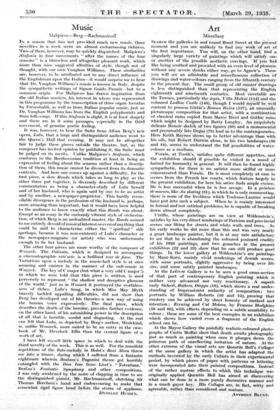Music
Malipiero—Berg—Rachnianinoff
IN a season that his • not provided much new music, three novelties in 'a week seem an almost embarrassing richness.
tWo of them, however, may be,quielkly dispatched. Malipiero's .
Sinfonia in four movements • " after the 'names of the four seasons " is a blameless and altogether pleasant work, which More than once suggested affinities of style, though not of thought, with our own Vaughan Williams. These similarities are, however, to be attributed not to any direct influence of the EngliShman upon the Italian—it Would 'surprise me to hear that Dr. Vaughan Williams's music is known in Italy, despite the sympathetic writings of Signor Guido Panain—but to a common origin. For Malipiero has draivn inspiration from the old Italian masters, his interest in whom was represented in this programme by the transcription of three organ toccatas 'by Frescobaldi, as well as from Italian popular music, just as Dr. Vaughan Williams has from the English polyphonists and from folk-songs. If this Sinfonia is slight, it is at least shapely and there are in it some passages, eripecially in the third .movement, of genuine poetic feeling.
It was, however, to hear the Suite from Alban Berg's new opera, Lulu, that a large and distinguished audience went to the Queen's Hall that evening. It may not be altogether fair to judge these pieces outside the theatre, but, as the composer has invited opinion by publishing it, the Suite 'must be judged on its merits. Unlike Malipiero's Sinfonia, -which conforms to the Beethoveniazi tradition at least in being an expression of feeling about the seasons rather than a descrip- tion of them, this music cannot be divorced from its dramatic contexts. And here one comes up against a difficulty, for the . first piece, a slow Rondo which takes as long to play as the other three put together, is diversely described by different commentators as being a character-study of Lulu herself and of her husband, who is again said by one to be an artist and by another, a newspaper-proprietor. This hardly recon- cilable divergence in the profession of the husband is, perhaps, more amusing than important, but it would have been helpful to the audience to know exactly what this Rondo was about. Except as an essay in the curiously vibrant style of orchestra- tion, of which Berg is an undoubted master, the Rondo seemed to me entirely devoid of musical interest or even of anything that could be said to characterize either the " spiritual" side (perhaps, because it was non-existent) of Lulu's character or the newspaper-magnate (or artist) who was unfortunate enough to be her husband.
The other four pieces are more worthy of the composer of Wozzeck. The Ostinato, which is designed to accompany a cinematographic entr'acte, is a brilliant tour de force. The Variations upon a melody in the music-hall style is at once amusing and sinister in the manner of the café-music in lrozzeck. The key of C major (but what a very odd C major !) in which we were told that this piece is written, is used perversely to represent " the shallow and deceptive glamour of the world," just as in Wozzeck it portrayed the worthless- ness of riches. Lulu's . Song, in which Miss May Blyth bravely tackled appalling difficulties, did not show that Berg has developed out of his theories -a new way of using i he human voice expressively. The . final piece, which describes the death of the heroine; -provides' further evidence, on the other hand, of his astonishing power in the description of all that is horrible, sordid and disgusting. At the end. one felt that Lulu, as depicted by Berg's author, Wedekind, is, unlike Wozzeck, more suited to be an entry in the case- book of Mr. Havelock Ellis than the central figure of a work of art.
I have left myself little space ;in which. to deal with the third novelty of the week. This:is as well. For the.manifold repetitions of the flute-melody. in. Hoist's , Beni Mom threw me into a trance, during which I suffered from a fantastic nightmare wherein Braluns's. Paganini theme got horribly entangled with the Dies Irae. from Liszt's ." Totentanz," Berlioz's Fantastic Symphony and other. , compositions. Lwas only, awakened by the.noise of clapping, in time to see the distinguished pianist, Mr. Rachmaninoff, clutching. Sir Thomas. Beecham's hand and endeavouring. to make that somewhat rigid figure_ bend :before., the .storin of applause.
• DYNELEY HUSSEY.






































 Previous page
Previous page